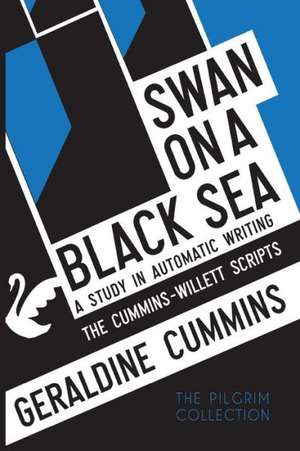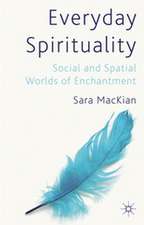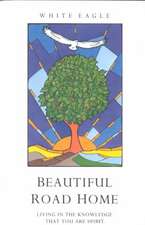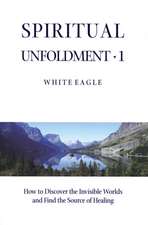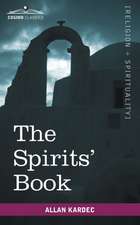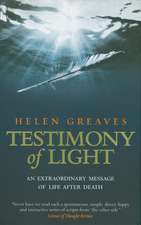Swan on a Black Sea
Autor Geraldine Cumminsen Limba Engleză Paperback – 6 mai 2013
Preț: 106.52 lei
Nou
Puncte Express: 160
Preț estimativ în valută:
20.39€ • 21.51$ • 16.99£
20.39€ • 21.51$ • 16.99£
Carte disponibilă
Livrare economică 13-27 decembrie
Preluare comenzi: 021 569.72.76
Specificații
ISBN-13: 9781908733764
ISBN-10: 1908733764
Pagini: 220
Dimensiuni: 152 x 229 x 13 mm
Greutate: 0.33 kg
Editura: White Crow Books
ISBN-10: 1908733764
Pagini: 220
Dimensiuni: 152 x 229 x 13 mm
Greutate: 0.33 kg
Editura: White Crow Books
Notă biografică
Geraldine Cummins (January 24, 1890 - August 24, 1969) was an Irish automatic writing medium and author. Cummins automatic writing was mainly of a spiritual nature and was witnessed by several theologians and scholars who later endorsed and edited her writings. Her first book, The Spirits of Cleophas (1928), claimed to supplement the biblical books of the Acts of the Apostles and the epistles of St. Paul. It was a historic narrative of the early church and the work of the apostles from immediately after the death of Jesus to St. Paul's departure from Berea for Athens. In the production of the first two sections of the book, Cummins was associated with F. Bligh Bond, the noted English architect, illustrator, archaeologist, and psychical researcher, but later she received the scripts independently. Her second book, Paul in Athens (1930) is a continuation of 'Cleophas 'The third, The Great Days of Ephesus (1933), followed the same line of thought. The trilogy offered new interpretations of several obscure passages in the Acts of the Apostles, which apparently are more in line with the early church. For example, it was claimed that only a profound student could have given the head of the Jewish community in Antioch the title "Archon," because the usual title was "ethnarch." In the chronicle of Cleophas, Cleophas was not the direct communicator. The information came through an entity know as "the messenger." The messenger was ostensibly lower down the spiritual food chain than Cleophas and therefore could communicate with Cummins on the earth plane. Cummins's fourth book, The Road to Immortality (1932), a series of communications allegedly from F. W. H. Myers, gives a glorious vision of the progression of the human spirit through eternity. In the Introduction Beatrice Gibbes described the method of communication employed by Cummins. She would sit at a table, cover her eyes with her left and hand on concentrate on "stillness." She would then fall into a light trance or dream state. Her hand would then begin to write. Usually, her "control" would make some introductory remarks and announce that another entity was waiting to speak. Because of her semi-trance condition and also because of the speed at which the writing would come, Gibbes would sit beside her and remove each sheet of paper as it was filled. Cummins' hand was quickly lifted by Gibbes to the top of the new page, and the writing would continue without a break. In one sitting, Gibbes stated, Cummins wrote 2,000 words in 75 minutes, whereas her normal compositions were much slower - perhaps 800 words in seven or eight hours. Gibbes added that she witnessed the writing of about 50 different personalities, all claiming to be 'dead,' and all differing in character and style, coming through Cummins' hand. The noted physicist and psychical researcher Sir Oliver Lodge offered his observations of Cummins's genuineness in the book's preface: "I believe this to be a genuine attempt to convey approximately true ideas, through an amanuensis of reasonable education, characterized by ready willingness for devoted service, and of transparent honesty." Cummins went on to author The Swan on a Black Sea: a Study in Automatic Writing: the Cummins-Willett Scripts (1970). The book is a detailed study of her automatic scripts received from the deceased "Mrs. Willett" a pseudonym of Winifred Coombe-Tennant, the British suffragette, politician, and philanthropist. This highly regarded work contains a foreword by parapsychologist Professor C. D. Broad.
Cuprins
FOREWORD by Professor C. D. Broad ...ix INTRODUCTION by Signe Toksvig ... THE BEGINNING OF THE CUMMINS - WILLETT SCRIPTS ... THE SCRIPTS AND NOTES ... PERSONAL BACKGROUND ... THE LINES OF COMMUNICATION ...
